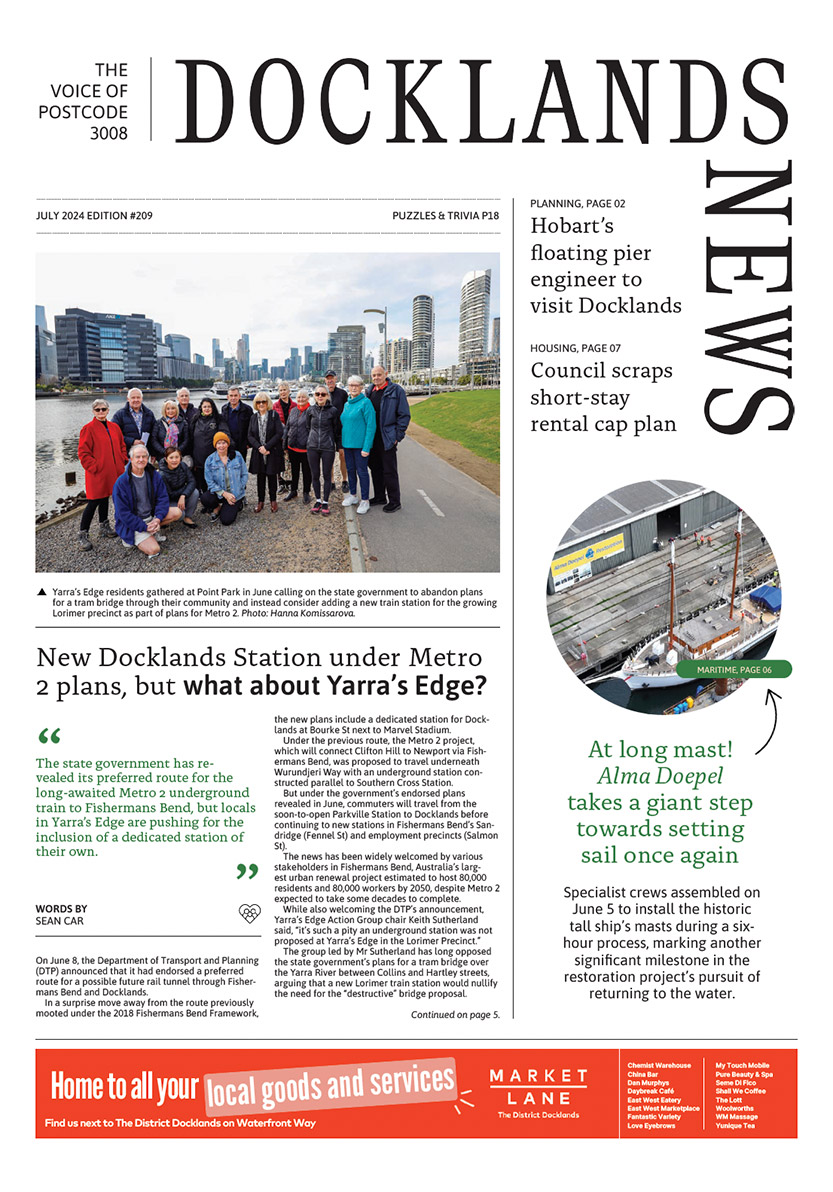Locals left out of planning for revived Stadium precinct
The AFL has not consulted with Docklands locals on the future of the revamped Marvel Stadium precinct, despite earlier promises to do so.
As the $225 stadium redevelopment nears completion, it has emerged the league submitted an “activation strategy” to the City of Melbourne without input from Docklands Representative Group (DRG), nor residents within the stadium precinct.
The failure to consult with the community is at odds with the AFL’s commitment to improve the community and “everyday” mode of the stadium precinct.
Throughout the redevelopment, it has reiterated the importance of Docklanders to the future success of the stadium surrounds.
AFL property development general manager Matthew Chun told the Docklands Summit in September 2022: “We’re trying to make the stadium an asset that everyone can use so it’s a community asset. We see it as a community asset, and we want everyone to enjoy it, not just on event days,” he said.
Months prior, in June 2022, a representative confirmed with Docklands News that the community would be consulted prior to submitting the key strategy.
But it appeared that local voices, including residents from the two residential towers within the immediate stadium precinct – Victoria Point and Lacrosse – had been snubbed.
“It seems strange to us that there didn’t seem to be any requirement that the activation strategy had any input from locals,” a DRG spokesperson said.
The AFL, which owns Marvel Stadium, did not respond to questions put by Docklands News.
The failure to consult with the DRG was seen as a snub by the group, especially after its work in bringing together key stakeholders and the community prior to the government-funded works commencing.
In late 2021 DRG organised a webinar for locals with the AFL, builder John Holland Group, Grimshaw Architects and placemaking group Village Well.
During the event, it was reiterated by all parties that a vibrant stadium precinct was dependent on local involvement and buy-in.
“When we started this project, a lot of the questions we were asking ourselves was ‘how can it contribute to the precinct in a civic way? How can it give back to the precinct, and interact, and really start to be a catalyst for this regeneration of Docklands?’” Grimshaw principal Simon Anson told locals.
“Yes, it’s really efficient and works really well on game day, but it also has an identity within its everyday mode, which is probably lacking at the moment.”
Village Well managing director Gilbert Rochecouste added that local participation was crucial.
“I think we need to go through another process of engagement with the community to see potential fits and what will work for the area on game day and non-game day. The key word here is ownership and having some skin in the game, where we see some of these great institutions that have a local population have some say.”
However, the further engagement never took place.
Despite organising the event — which was well received by all parties — and being Docklands’ only residents’ group, the DRG has had little to no interaction with the AFL since.
It said this was another example of local activities not requiring the involvement of Docklands residents.
“We had the webinar, and they said the redevelopment was going to be a key for Docklands and we specifically spoke about having input, and they responded positively to that,” the DRG spokesperson said.
“We put forward that we didn’t want a stadium precinct that is vibrant for a few hours a week and then dead for the rest. It’s important that that’s the case. I don’t know what this activation strategy is, but it is disappointing that no-one has reached out … it’s not like they don’t know how to contact us.”
However, 20-year Docklands resident and former Docklands Chamber of Commerce (DCC) executive officer Shane Wylie, who resigned from the role in February, said that at no point had he felt the AFL hadn’t been forthcoming about its plans for upgrading and activating Marvel Stadium.
“If anything, the AFL has only been too open as to what it has been planning for Marvel Stadium. At no point while I was at the chamber, did we or myself personally feel left out of the conversation,” he said. “I was very well aware of everything that was going on with Marvel Stadium from four years ago onwards.”
As for consulting with community, I think consultation has been more than sound when you’re talking about a quarter-of-a-billion-dollar project.
DCC president Daniel Hibberd said it had made plans to meet with AFL representatives in May to get an update on the project, where he hoped more details would be provided as to future activation plans.
The stadium upgrades are expected to be completed later this year.
Most notably from a community perspective, the revamp will feature a new “Town Square” at the southern end of the stadium.
Outside gates 1 to 3 (at the end of the pathway from Southern Cross Station), the Town Square would represent a naturally lit undercover civic area, including both food and drink outlets and space for “temporary non-traditional events”.
The $225 million Marvel Stadium upgrade is funded by the state government after the AFL, in a 2018 deal, committed to keeping the Grand Final within Victoria until at least 2058, quelling strong interest from rival states. •

Neighbourhood Watch and RACV launch apartment crime prevention program









 Download the Latest Edition
Download the Latest Edition